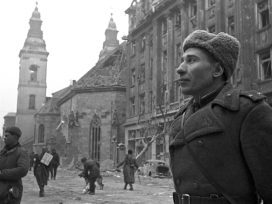The end of the Cold War and geopolitical changes on the continent have led us to a situation in which the deconstruction of European and national identity has become a fact. Since then, citizens have been exposed to the new cultural dimension of the united Europe – which is still under construction – and are captured in the process of the revaluation of the history of the continent.
History is not only a repository of data from the past. It also offers critical interpretation and legitimizes group identity as memory of shared experience, codes of behaviour and systems of ethics. European history developed in such a way that our historical awareness is first of all built on a consciousness that pits one country against another. This, together with demographic challenges facing the continent, make the problem of building a collective European identity much more complex and delicate.
If discussion about the new cultural identity of Europe does not necessarily produce heated debates and arguments, the historical narratives produced by each European country are much more disturbing and dangerous. Devotion to “historical truth” equals society’s dedication to justice and may become an easy target for political manipulation. Stimulated nationally by leaders of radical parties or social movements and media, historical debates have their impact both on bilateral and multilateral international relations, and on citizens who, not accustomed to differentiated reflections on international matters, are often manoeuvred into exploiting historical myths.
“The revenge of memory” is present in diverse and sometimes ambiguous historical debates; and it affects everybody. It has both an individual and a collective dimension, and stands both for the need to revaluate one’s own historical past and the desire for its proper recognition on an international platform.
In the Central European context, “the revenge of memory” takes the form of a confrontation of opinions and political statements between – for example – Poles, Czechs and Germans, resulting from the demand made by some German organizations (the so-called “expellee Germans”) for a recognition of their status as victims of the forced migration of ethnic Germans after the Second World War.
Another form of the “revenge of memory” is the demythologizing of formerly dominant national narratives, like the one in which the Polish nation has always been the victim and never the aggressor. This view was seriously drawn into doubt during the Polish debate about the massacre in Jedwabne, and much exploited by international media.
More cases of ambivalent revaluations of the past can be found when we compare Polish history books with those written in Belarus, Ukraine or Lithuania. Viewed from the perspective of these nations, Poles were rarely the victims but had a rather more sinister role. Another example comes from a recently published French-German history book. The authors’ claim that Poland in the 1930s was nothing other than an authoritarian regime (and that Commander Pilsudski – an autocrat – was extremely popular among Poles) may lead to the peculiar conclusion that there is no real difference between autocrats like Hitler, Mussolini, Franco and Pilsudski. More of these examples can be found in the past of other European countries and in the present, as in the current Hungarian-Slovak relations.
Yet, “the revenge of memory” is not just a hot political issue; it may also bring positive results and become a lesson of history. Deconstruction of myths does not equate destruction, but rather the rethinking and rearranging of the symbolic meaning of history. Here Poland can serve as an example of the problems connected with identity based on historical mythology, and of adopting a new language and political culture in international relations.
Seen from the past, Polish national identity was created through dramatic events in the nineteenth and twentieth centuries: partitions, wars, Stalinism and an authoritarian regime. All of these shaped Polish attitudes and the collective will to survive, and helped preserve dreams of the romantic past. Since then, Poles have talked of national martyrdom, a messianic and symbolic vision of the world in which Poland, through its suffering, saved itself and the whole world. This view has been part of public education, and the history of Poland has been presented as the history of an oppressed and innocent country. It also influenced the language of public debate and a specific rhetoric was adopted: we never ask whether we were attacked or not, but whether we lost or won. Even when speaking about accession to the EU, radical sceptics wondered if it was going to be the next battle of Grunwald (when we won) or the next partition (when we lost).
In 1989, the political independence of Poland and its neighbours was restored and a major obstacle to the attainment of new quality of political relations was thereby eliminated. The ethos of survival was substituted for a logic of equity and fairness. Poles started to do their “history lessons” and asked if they had harmed anybody in the past or if they were doing so now. Yet the nation’s feeling of “suffering-and-saving-the-world” should not be substituted by a feeling of guilt, so eagerly encouraged by international “experts”, diasporas or media.
Polish-Ukrainian relations can serve as a positive example of the reworking of memory to overcome a tragic historical legacy. The cooperation was initiated by Polish and Ukrainian intellectuals, and soon after regaining independence this intellectual activity was faced with a new economic reality. Borders were opened to ordinary people, Ukrainians started to visit Poland and direct contact helped remove stereotypes. In 1990, the Polish Senate condemned The Vistula Action; the Ukrainian democratic opposition met with the Citizens’ Parliamentary Party’s (Obywatelski Klub Parlamentarny) authorities in Jablonna; and the presidents of both countries initiated talks on the more difficult issues. The result of these conciliatory actions was the general support by Polish citizens for the Orange Revolution. For some time now, political cooperation has slowed down, but non-governmental institutions and local governments continue their activities and feel responsible for the development of partner cooperations that can prevail over the toxic past.
A tragic historical legacy can be overcome if the efforts of governments meet the expectations of civil society and citizens who understand that the tragic lessons of history are not “traps” but warnings. As Zdzislaw Mach once observed: “Legitimization of historical and memory pluralism, revision and deconstruction of national myths and building up a new symbolic world in a more pluralistic way, closer to a citizen, will allow people to become more aware of their history and make better use of their thinking about the future and their historical heritage”. Instead of judging, we should try to understand, and to this end history can be of use.






